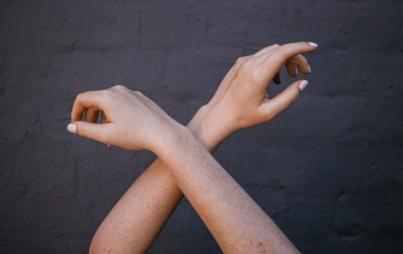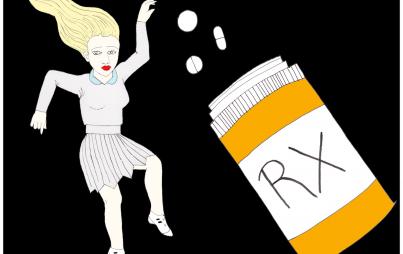
"If I’m being totally honest with you, I feel a burst of pride whenever someone tells me I look too put together to have been given this diagnosis."
Fun fact: I am an OCDame in more ways than one.
In addition to living with obsessive compulsive disorder, I also live with obsessive compulsive personality disorder. The name is honestly a bit of a misnomer. OCD and OCPD are very different animals, but they do intersect and intertwine in interesting (and sometimes excruciating) ways when it comes to my personal brain — though that’s an entire essay of its own.
If I had the chance to choose a better fitting name for OCPD, I’d call it Perfectionistic Personality Disorder. It’s more accurate, plus alliteration is always a nice bonus. I would not be shocked to see the fickle and arbitrary DSM gods alter the name to something along those lines in later iterations of the Bonkers Bible, but for now, OCPD it is. If you’ve never heard of OCPD, no worries! I’d never heard much of it until I was diagnosed with it, and I'm a mental health activist who scored a 4 on the AP Psych test in high school.
Personality disorders are often ignored in mainstream discussions of mental illness, though the occasional detour to stigmatize and vilify Borderline Personality Disorder is a notable exception. Even the disorders most familiar to the public (antisocial, borderline, narccisistic) are often cloaked in hyperstigmatized stereotype and myth, with much of the available information about them focusing on the loved ones affected by the disorder rather than those who suffer from it.
OCPD is characterized in the DSM V as “A pervasive pattern of preoccupation with orderliness, perfectionism, and mental and interpersonal control, at the expense of flexibility, openness, and efficiency, beginning by early adulthood and present in a variety of contexts.”
Most of the time I don’t even think about my personality disorder, but when I do feel like talking about it, I don’t have a lot of people to turn to. It makes people uncomfortable. When I disclose my personality disorder — especially to loved ones — I am often met with resistance.
Most resources describe it by pointing out how difficult it is to live with someone like that, and while I'm sure that's true, I can assure you that it is infinitely more difficult to live as someone like that.
Personality disorders like OCPD have the special distinction of being “learned disorders” that can only be diagnosed during or after the onset of adolescence. I usually explain it by saying I was born with OCD (I’ve exhibited symptoms since toddlerhood), but I developed OCPD as I grew up.
Personality disorders are sort of like credentials tacked on to the end of your name, indicating that you’ve been through some pretty rigorous awfulness in order to end up moving through the world in the way that you do.
An example: Jennifer Berrett, OCPD (Obsessive-Compulsive Personality Disorder); or, as I sometimes like to think of it: Jennifer Berrett, HSSS (Has Seen Some Shit).
Another, less bleak way of putting it: we are survivors. We are this way because if we weren’t, we would not be here. To look away from us is to flinch at the flickering blaze of human resilience. We are who are because, at some point, that was who we needed to be.
Couldn’t you say the same for yourself?
Most of the time I don’t even think about my personality disorder, but when I do feel like talking about it, I don’t have a lot of people to turn to. It makes people uncomfortable. When I disclose my personality disorder — especially to loved ones — I am often met with resistance.
“But you don’t have a personality disorder! That diagnosis is so serious, and you’re way too put together.”
“You do NOT have a personality disorder — you’re so nice!”
“Well, at least it’s not one of those really crazy ones, you know?”
I know people mean these as compliments or words of wisdom, but they instead leave me feeling isolated and unsure of myself. Telling someone they don’t have a disorder after they’ve confided in you is invalidating in any situation, but when it comes to personality disorders, the sentiment stings even more. It’s like if someone showed you a giant scar on their back and you replied by saying, “But that’s not really that bad of a scar, since your shirt covers it up most of the time.”
It’s a dick move, even if you meant it as a comforting gesture.
Popular belief posits that personality disorders are always easily identifiable by family and friends, but that really isn’t the case for a lot of us. Even if we’re unaware of our disordered behavior, many people with personality disorders mask and hide aspects of themselves as a function of the disorder itself. Telling us we don’t have something that we likely took a lot of time and effort to come to grips with can really mess with our sense of what’s real and what isn’t — which, in many cases, is already on shaky ground.
It’s also distressing. I had to unpack a lot of very ugly internalized ableism when I was first diagnosed. It’s one of the reasons many mental health professionals will withhold a personality disorder diagnosis from their patients; the stigma of the diagnosis and its damning list of symptoms and prognoses can be overwhelming and, in some cases, damaging or re-traumatizing.
As for being “way too put together” — OF COURSE I LOOK PUT TOGETHER. I’ve spent whole chunks of my life crafting that exterior. I am so good at it, in fact, that I often trick myself in the process. I struggle to separate my true self from that “put together” self so many people compliment me on. The reality is probably somewhere in the middle, but I’m still trying to find it.
If I’m being totally honest with you, I feel a burst of pride whenever someone tells me I look too put together to have been given this diagnosis. Looking put together makes me feel more in control. It makes me feel like a better person for having hid my wounded parts so thoroughly. It is an incredibly unhealthy belief that I am still working to unpack, and I wholeheartedly believe that it’s a mindset our entire culture needs to unpack. Acting like you’re fine when you aren’t is not a morally superior way to move through life — it’s just a more painful and lonely way to move through life, and I am eager to untangle suffering from goodness. They are anything but synonyms.
When someone denies my personality disorder, it makes the process of identifying and challenging the thoughts and behaviors that disorder causes even more difficult. A common thread that runs through all personality disorders is a lack of self-awareness. There are broken parts of me that I can’t see. I’m working very hard to uncover them and heal them in a way that improves the quality of my inner and outer life. I don’t need anyone else muddying the waters of my trauma; I do that enough all on my own.
When someone discloses their personality disorder to you, it means they truly value and trust you. Honor that trust by honoring their experiences.
Say things that acknowledge their hurt and encourage their healing. Ask us how we feel about the diagnosis. Remind us that we are good people regardless. Ask us if we want some pizza. We don’t need you to fix us or tell us that we aren’t broken — we just need love. And pizza. It really is that simple.







